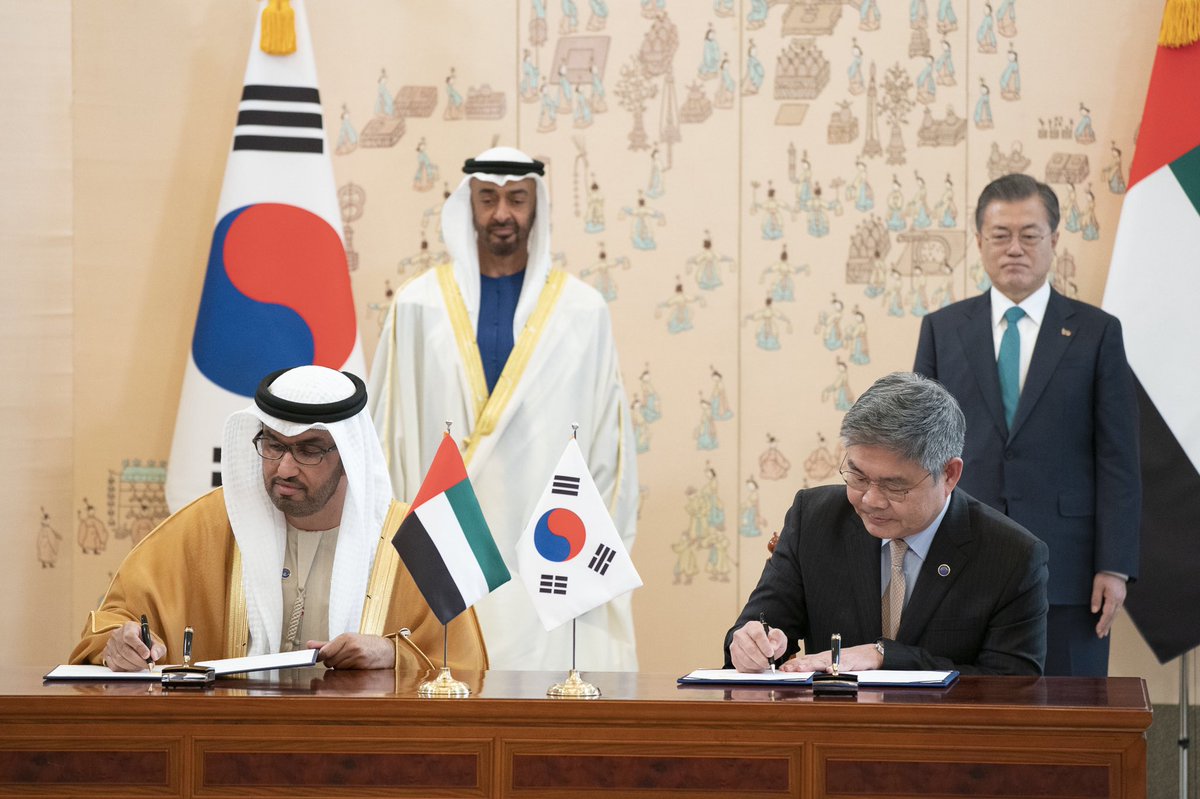His Highness Sheikh Mohamed bin Zayed Al Nahyan, Crown Prince of Abu Dhabi and Deputy Supreme Commander of the UAE Armed Forces, and South Korean President Moon Jae-in witnessed the signing of an agreement between Abu Dhabi National Oil Company (ADNOC) and South Korea Engineering and Construction (SKEC) to build the world’s largest crude oil storage facility in Fujairah.
The project that will cost Dh4.4 billion will have a capacity of 42 million barrels, His Highness the Crown Prince of Abu Dhabi said in a Tweet, February 27.
During an official visit to the Republic of Korea by His Highness Sheikh Mohamed bin Zayed Al Nahyan, ADNOC has signed three framework agreements with Korean energy companies.
The agreements will explore upstream exploration and production opportunities, potential downstream investments and bunkering opportunities for both crude oil and liquified natural gas, LNG, reported WAM.
The agreements have been signed with the Korea Gas Corporation, KOGAS, the world’s second largest buyer of LNG, which has conducted a feasibility study on LNG bunkering at Fujairah port; the Korea National Oil Company, KNOC, which has a 30 percent stake in ADNOC’s Al Dhafra Petroleum company and is seeking to increase oil storage in the Republic of Korea by 24 million barrels until 2025 and GS Energy, an independent Korean energy company that has a 10 percent stake in Al Dhafra Petroleum and 3 per cent stake in ADNOC Onshore.
The agreements were signed by H.E. Dr. Sultan bin Ahmad Sultan Al Jaber, Minister of State and ADNOC Group CEO, and Kim Young Doo KOGAS CEO; Yang, Su Yeong, KNOC CEO and Huh, Yongsoo, GS Energy CEO.
Commenting on the announcement, Dr. Al Jaber said, “The UAE, Abu Dhabi and ADNOC have enjoyed excellent business relationships with the Republic of Korea and the growing links between ADNOC and Korean companies are a testament to the depth and importance of those relationships, which the leadership of the UAE is keen to enhance.
“Our discussion explored domestic and international growth opportunities across a range of areas, including oil and LNG bunkering, meeting the Republic of Korea’s growing energy demands and attracting investment to our expanding upstream exploration and development operations and our downstream and gas expansion plans.”
He added, “As we successfully deliver our 2030 smart growth strategy, we will continue to work with partners who enable us to unlock and maximize value, contribute technology and help us secure access to the new centers of global demand.”
South Korea was the world’s eighth-largest energy consumer in 2017. According to the International Energy Agency, IEA, it imported about three million b/d of crude oil and condensate, making it the fifth-largest importer in the world. It is highly dependent on the Middle East for its oil supply, and the region accounted for more than 82 percent of its 2017 crude oil imports, of which 11 percent was supplied by ADNOC.
It is also the world’s third-largest LNG importer. According to its ’13th Long-term Natural Gas Supply’ plan domestic natural gas demand, for power generation, is expected to reach 40.49 million tonnes (MMt) by 2031 – a 3 MMt increase over 2017 levels.




